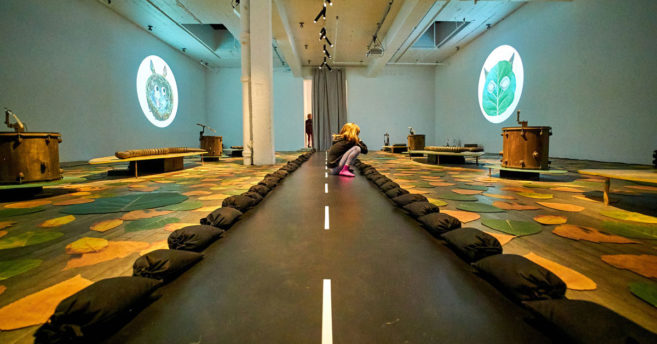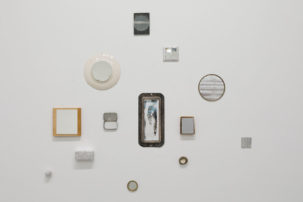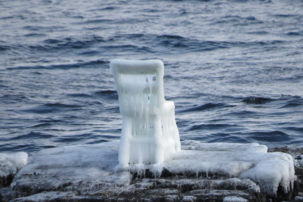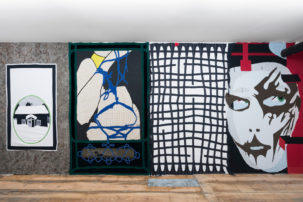There’s something about the gossipy, Greek-chorus quality of the particular kind of chatter that takes place along the ostentatious, red-carpeted theatre lines of a film festival like Cannes that makes a badly reviewed movie—in crass Hollywood terms, a flop—feel like a scandal, ironically causing its value as spectacle to skyrocket. This proved true on Friday afternoon during the second and final festival screening of Quebecois filmmaker Xavier Dolan’s latest and most star-studded film, Juste la fin du monde.
I arrived an excessive three hours prior to the reprise screening of what Vanity Fair crowned “the most disappointing film at Cannes,” joining a substantial queue of fellow rubberneckers. In lines like these, small talk is a form of survival. American men in Clarks desert boots and Ray Bans were eager to proclaim that they had known all along the film would tank, while French-speaking teenagers refused to entertain the idea that anything short of a tour de force could possibly come from the mind of the beloved and endlessly cool golden boy of the Croisette. The wave of snarky Twitter criticism that crashed through the Internet the day before had left an irresistible opportunity for bickering in its wake. What better way to flaunt your MA in cinema studies than to rip a film to shreds, and what better way to display your devotion to the church of cinephilia than to defend an unpopular one? By the time the theatre doors opened, the line had evolved into a throbbing crowd of mixed reviews for a film none of us had seen.
Juste la fin du monde follows Louis (Gaspard Ulliel), a stoic, 34 year-old queer playwright who returns to his estranged family after a 12-year absence in order to announce in person that he is terminally ill. As an adaptation of a French play that orbits topics of queerness and familial dysfunction, the project would seem an obvious addition to Dolan’s distinct and formidable body of work. However, as the film opens, we quickly find ourselves in a world unlike the indulgently cool, emotionally exhilarating and sensory-rich space that audiences have grown to expect and crave from Dolan. Instead, we are met with discomfort, anxiety and a collection of deeply incompatible characters, each exuding their own uniquely unlikable brand of adult emotional awkwardness.
Despite diplomatic attempts from the repressive yet sympathetic mother (Nathalie Baye), no one seems to like each other very much. Throughout the film, they are unable to display any semblance of the compassion or comfort that comes with unconditional love, which is a talking point that quick-to-judge critics have sloppily tried to use as an argument for inadequate performances from the forceful troupe of French film stars. They simply aren’t meant to feel like a family. The characters acknowledge this for themselves when Louis meets his pitiably submissive sister-in-law (Marion Cotillard) for the first time. As he moves to shake her hand, his tragically hopeful stoner sister (Léa Seydoux) protests, saying, “You shake hands like you’re presidents or strangers.” Louis’ abusively blunt brother (Vincent Cassel) affirms this: “They are strangers.” Throughout the film, great care is taken to drive home the notion of “family” as nothing but a six-letter word.
Perhaps the most frustrating member of the emotionally stunted family is Louis himself, who remains silent and agonizingly withholding for much of the film. A great joke is made out of this as he passes a suicide-hotline billboard that reads, “Besoin de parler?” (“Need to talk?”)—a punchline that lands in the macabre as we recall his illness. This need—specifically, to confess before it’s too late—is what drives the film’s dramatic tension (or perhaps in this case, dramatic anxiety), making his silence all the more torturous. Unlike Dolan’s earlier protagonists, who proudly wear their pain, anger and desire on their sleeves, we see the angst of the director’s recurring queer (anti-)hero age into something much less fun to watch. Here, pain ossifies into chips on shoulders, resulting in a void of reticence and inaccessibility.
Unlike the electrically charged familial strife in Dolan’s earlier hits like Mommy or J’ai tué ma mère, the dysfunction in Juste la fin du monde is tedious and testing. The arguments between the characters tumble clumsily in circles as they grasp for either connection or closure, but never quite manage to reach beyond the islands created by their individual defence mechanisms. The result is an understated yet powerful authenticity, a carefully acute portrayal of the sad simplicity of familial conflict after it’s been left to compound and stagnate over decades of neglect.
There is no pleasure in the pain of this film. After a mere 15 minutes, the viewer yearns for a moment of respite just as desperately as the characters themselves. This respite never arrives. Instead, relief comes during the brief moments of escapism granted by Louis’ feverish, dream-heavy flashbacks, which transport the viewer back to the life of a younger Louis and, interestingly, to the signature panache and contagious verve of a younger Dolan. It feels deliciously good. Upon seeing his old mattress, Louis is triggered to recall an adolescent love. A pop song throbs, the colours explode and the camera loosens its tight, suffocating grip as we observe an adolescent Louis rolling around a bedroom making out with a shirtless, longhaired, Ryan McGinley–esque teen dream of a boy. As the flashbacks end and the pop songs collapse, it really does feel like the end of the world.
It certainly is the end of the bold, luscious and youthful world of the enfant terrible incarnation of Dolan that has been hooking audiences and academics alike for nearly a decade. He has declared this himself, in the move toward big-name talent and away from his trademark use of French Canadian settings, actors and dialect. It’s difficult not to long for the old Dolan. Like Louis’ dreamy flashbacks, there is a bittersweet nostalgia in recalling the insurgent Quebecois heat that defined Dolan’s prodigy days (although I did appreciate the wink to Montreal art-scene roots with the inclusion of an early-era Grimes song during one of Louis’ flashbacks).
In interviews, it is common for Dolan to get prickly whenever his age is mentioned. However, it seems silly to consider this shift in cinematic sensibilities without briefly mentioning that there is a significant distinction between a 19-year-old punk upstart and a 27-year-old industry darling. The fireworks that caught our initial attention seem to be settling into a slow burn. While this shift toward subtlety is exciting, it takes a second to process.
To decide whether the film is good or bad is an attractive pursuit—especially in light of the exciting plot twist that occurred on the final night of the festival, when the film was awarded the Grand Prix—but surely when we look at the newest work of an auteur with as illustrious and complex a career as Dolan’s, the least interesting question we can ask is one of “goodness.” When considered outside the catty framework of critics with trigger-finger Twitter habits (and away from the bewitching lights of the yacht-studded Cannes waterfront), Dolan’s film exists in a grey area, a transitional space that suggests a definitive departure without the satisfaction of a clear destination. Perhaps it doesn’t have the violent magnetism of his greatest hits, but it contains a new kind of emotional palette that shows immense promise for a graceful maturation into a new era of Dolan. The only way to truly understand Juste la fin du monde will be by framing it as a bridging work for whatever comes next (his next film is slated to be an English-language American production), which is a relief, because it means that the way we talk about this film in 10 or 15 years will be determined by Dolan himself, not by the critics or the Cannes jury.
Claire Bargout is a Canadian writer, actor and filmmaker based in Los Angeles.

 Film still from Xavier Dolan's Juste la fin du monde (2016)
Film still from Xavier Dolan's Juste la fin du monde (2016)







